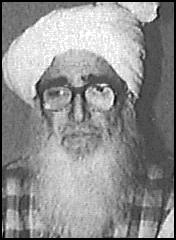Abdul Haq (Islamic scholar)
| Maulana Abdul Haq مولانا عبد الحق |
|
|---|---|
 |
|
| 1st Chancellor of Darul Uloom Haqqania | |
|
In office In office 23 September 1947 – 7 September 1988 |
|
| MNA for Peshawar Division | |
|
In office In office 14 April 1972 – 10 January 1974 In office 26 March 1977 – 5 July 1977 In office 20 March 1985 – 29 May 1988 |
|
| Title | Shaykh al-Hadith |
| Born | 11 January 1912 Akora Khattak, British India |
| Died | 7 September 1988 Peshawar, Pakistan |
| Nationality | Pakistani |
| Occupation | Islamic scholar, Politician, Teacher |
| Religion | Islam |
| Denomination | Sunni Islam |
| Jurisprudence | Hanafi |
| Movement | Deobandi |
| Notable idea(s) | Darul Uloom Haqqania |
| Alma mater | Darul Uloom Deoband |
|
Influenced
|
|
| Awards |
Sitara-i-Imtiaz Honorary PhD in Divinity, University of Peshawar |
Abdul Haq (Urdu: عبدالحق, Pashto: عبدالحق, ‘Abdul-Ḥaqq; 11 January 1912 – 7 September 1988) of Akora Khattak, sometimes referred to as Abdul Haq Akorwi (Urdu: عبدالحق اکوڑوی, ‘Abdul-Haqq Akoṛwī) was a Pakistani Islamic scholar and the founder, chancellor, and Shaykh al-Hadith of the Islamic seminary Darul Uloom Haqqania. He was involved in politics as a member of the political party Jamiat Ulema-e-Islam. He served three times in the National Assembly of Pakistan and was an active proponent of the Khatm-i Nabuwwat movement.
Abdul Haq completed his religious education in India at Darul Uloom Deoband. He taught at Deoband for four years until difficulties arose due to the independence of Pakistan. In 1947, he founded Darul Uloom Haqqania in Akora Khattak, one of the first Islamic seminaries to be established in Pakistan. He taught hadith at the madrasah for the rest of his life and was well known by the title "Shaykh al-Hadith".
...
Wikipedia
